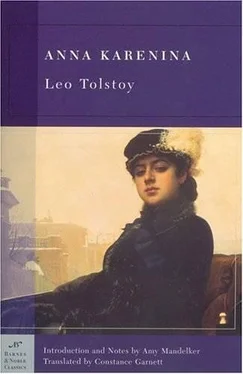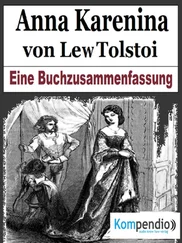Leo Tolstoy - Anna Karenina
Здесь есть возможность читать онлайн «Leo Tolstoy - Anna Karenina» весь текст электронной книги совершенно бесплатно (целиком полную версию без сокращений). В некоторых случаях можно слушать аудио, скачать через торрент в формате fb2 и присутствует краткое содержание. Жанр: Классическая проза, на английском языке. Описание произведения, (предисловие) а так же отзывы посетителей доступны на портале библиотеки ЛибКат.
- Название:Anna Karenina
- Автор:
- Жанр:
- Год:неизвестен
- ISBN:нет данных
- Рейтинг книги:4 / 5. Голосов: 1
-
Избранное:Добавить в избранное
- Отзывы:
-
Ваша оценка:
- 80
- 1
- 2
- 3
- 4
- 5
Anna Karenina: краткое содержание, описание и аннотация
Предлагаем к чтению аннотацию, описание, краткое содержание или предисловие (зависит от того, что написал сам автор книги «Anna Karenina»). Если вы не нашли необходимую информацию о книге — напишите в комментариях, мы постараемся отыскать её.
Anna Karenina — читать онлайн бесплатно полную книгу (весь текст) целиком
Ниже представлен текст книги, разбитый по страницам. Система сохранения места последней прочитанной страницы, позволяет с удобством читать онлайн бесплатно книгу «Anna Karenina», без необходимости каждый раз заново искать на чём Вы остановились. Поставьте закладку, и сможете в любой момент перейти на страницу, на которой закончили чтение.
Интервал:
Закладка:
The Countess Lidia Ivanovna was a friend of her husband's, and the center of that one of the coteries of the Peterburg beau monde with which Anna was, through her husband, in the closest rapport.
"But I wrote to her."
"Yes, but she must have full details. Go to see her, if you're not too tired, my dear. Well, Kondratii will take you in the carriage, while I go to my committee. Once more I shall not be alone at dinner," Alexei Alexandrovich continued, but no longer in a jesting tone. "You wouldn't believe how I've grown used to you…"
And, with a prolonged pressure of her hand, and a particular smile, he helped her into her carriage.
XXXII
The first person to meet Anna at home was her son. He dashed down the stairs to her, in spite of the governess's call, and with frenzied rapture shrieked: "Mother! mother!" Running up to her, he hung on her neck.
"I told you it was mother!" he shouted to the governess. "I knew it!"
And her son, like her husband, aroused in Anna a feeling akin to disappointment. In her imagination he had been better than he was in reality. She had to descend to reality to enjoy him as he was. But, even so, he was charming, with his fair curls, his blue eyes and his chubby, graceful little legs in tightly pulled-up stockings. Anna experienced an almost physical delight in the sensation of his nearness, and his caresses; and a moral reassurance, when she met his ingenuous, trusting and loving glance, and heard his naive questions. Anna took out the presents Dolly's children had sent him, and told her son about Tania, a little girl in Moscow, and how Tania could read, and even taught the other children.
"Why, am I not as good as she?" asked Seriozha.
"To me you're better than anyone else in the whole world."
"I know that," said Seriozha, smiling.
Anna had scarcely drunk her coffee when the Countess Lidia Ivanovna was announced. The Countess Lidia Ivanovna was a tall, fleshy woman, with an unwholesomely yellow complexion and beautiful, pensive black eyes. Anna liked her, but today she seemed, for the first time, to see her with all her shortcomings.
"Well, my friend, were you the bearer of the olive branch?" asked Countess Lidia Ivanovna, the minute she entered the room.
"Yes, it's all over, but it was not at all as serious as we thought," answered Anna. "My belle-soeur is, in general, much too categorical."
But Countess Lidia Ivanovna, who was interested in everything that did not concern her, had a habit of never listening to what interested her; she interrupted Anna:
"Yes, there's plenty of sorrow and evil in the world- and I am so fatigued today!"
"Oh, why?" asked Anna, trying to repress a smile.
"I'm beginning to weary of vainly breaking lances for the truth, and at times I'm altogether unstrung. The affair with our Dear Sisters [this was a religiously patriotic, philanthropic institution] started off splendidly, but it's impossible to do anything with such people," added Countess Lidia Ivanovna, with a mocking submissiveness to fate. "They pounced on the idea, and mangled it, and afterward they thrash it out so pettily and trivially. Two or three people, your husband among them, grasp all the significance of this affair but the others merely degrade it. Yesterday Pravdin wrote to me…"
Pravdin was a well-known Pan-Slavist abroad, and Countess Lidia Ivanovna told the gist of his letter.
Next the Countess spoke of other unpleasantnesses and intrigues against the work of the unification of the churches, and departed in haste, since that day she had to attend the meeting of another society, and also a Slavonic committee.
"All this is as it has always been; but how is it I didn't notice it before?" Anna asked herself. "Or has she been very much irritated today? It's really ludicrous: her object is to do good; she's a Christian; yet she's forever angry, and forever having enemies- and always enemies in the name of Christianity and doing good."
After Countess Lidia Ivanovna another friend came, the wife of a director of the Department, who told her all the news of the town. At three o'clock she too went away, promising to come to dinner. Alexei Alexandrovich was at the Ministry. Anna, left alone, spent the time till dinner in lending her presence to her son's dinner (he dined apart from his parents), in putting her things in order, and in reading and answering the notes and letters which had accumulated on her escritoire.
The feeling of unreasoning shame, which she had felt during the journey, and her agitation, had completely vanished. In the accustomed conditions of her life she again felt herself firm and irreproachable.
She recalled with wonder her state of mind only yesterday. "What was it? Nothing. Vronsky said something silly, which it was easy to put an end to, and I answered just as I should have. To speak of it to my husband would be unnecessary and impermissible. To speak of it would be to attach importance to that which has none." She remembered how she had told her husband of what was almost declaration made her in Peterburg by a young man, a subordinate of her husband's, and how Alexei Alexandrovich had answered that every woman of the world was exposed to this sort of thing, but that he had the fullest confidence in her tact, and would never permit himself to degrade her and himself by jealousy. "So then, there's no reason to say anything? And, thank God, there isn't anything to say," she told herself.
XXXIII
Alexei Alexandrovich came back from the Ministry at four o'clock, but as often happened, had no chance to drop in at her room. He went into his study to see the people waiting for him with petitions, and to sign certain papers brought him by his head clerk. At dinnertime (there were always at least three people dining with the Karenins) there arrived an old lady, a cousin of Alexei Alexandrovich; the director of the Department and his wife; and a young man who had been recommended to Alexei Alexandrovich for a post. Anna went into the drawing room to entertain these guests. Precisely at five o'clock, before the bronze Peter the First clock had finished the fifth stroke, Alexei Alexandrovich made his entry, in white tie and evening coat with two stars, as he had to go out directly after dinner. Every minute of Alexei Alexandrovich's life was taken up and apportioned. And in order to accomplish all that each day held for him, he adhered to the strictest orderliness. "Nor haste nor rest," was his device. He entered the dining hall, bowed to all, and hurriedly sat down, smiling to his wife:
"Yes, my solitude is over. You wouldn't believe how uncomfortable [he laid stress on the word uncomfortable] it is to dine alone."
At dinner he chatted with his wife about things at Moscow, and asked, with his mocking smile, about Stepan Arkadyevich; but the conversation was for the most part general, dealing with the official and public news of Peterburg. After dinner he spent half an hour with his guests, and, again with a smile, pressed his wife's hand, withdrew, and drove off to the Council. Anna went that evening neither to the Princess Betsy Tverskaia, who, hearing of her return, had invited her, nor to the theater, where she had a box for that evening. Her principal reason for not going out was because the dress she had expected to wear was not ready. All in all, Anna was exceedingly annoyed when she started to dress for the evening after the departure of her guests. Before her departure for Moscow she, who was generally a mistress of the art of dressing well yet inexpensively, had given her dressmaker three dresses to make over. The dresses were to be made over so that their old selves would be unrecognizable, and they should have been ready three days ago. It turned out that two dresses were nowhere near ready, while the other one had not been made over to Anna's liking. The dressmaker came to explain, asserting that her way was best, and Anna had become so heated that she blushed at the recollection. To regain her composure fully she went into the nursery and spent the whole evening with her son, putting him to bed herself, making the sign of the cross over him, and tucking him in. She was glad she had not gone out anywhere, and had spent the evening so well. She felt so lighthearted and calm, she saw so clearly that all that had seemed to her so significant on her railway journey was merely one of the ordinary trivial incidents of fashionable life, and that she had no cause to feel ashamed before anyone else or before herself. Anna sat down near the fireplace with an English novel and waited for her husband. Exactly at half-past nine she heard his ring, and he entered the room.
Читать дальшеИнтервал:
Закладка:
Похожие книги на «Anna Karenina»
Представляем Вашему вниманию похожие книги на «Anna Karenina» списком для выбора. Мы отобрали схожую по названию и смыслу литературу в надежде предоставить читателям больше вариантов отыскать новые, интересные, ещё непрочитанные произведения.
Обсуждение, отзывы о книге «Anna Karenina» и просто собственные мнения читателей. Оставьте ваши комментарии, напишите, что Вы думаете о произведении, его смысле или главных героях. Укажите что конкретно понравилось, а что нет, и почему Вы так считаете.












